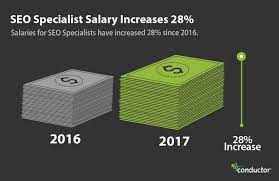Understanding SEO Analyst Salary Trends in the UK
The Average SEO Analyst Salary in the UK
Search Engine Optimization (SEO) analysts play a crucial role in helping businesses improve their online visibility and drive organic traffic to their websites. With the increasing demand for digital marketing expertise, SEO analysts are becoming an essential part of marketing teams across various industries in the UK.
When it comes to salaries, SEO analysts in the UK can expect to earn competitive pay based on their skills, experience, and location. On average, the salary range for SEO analysts in the UK is between £20,000 to £40,000 per year.
The salary of an SEO analyst can vary depending on factors such as company size, industry sector, and level of experience. Entry-level SEO analysts with less than one year of experience can expect to earn around £20,000 to £25,000 per year. As they gain more experience and expertise in SEO techniques and tools, their salary can increase to £30,000 to £35,000 per year.
Experienced SEO analysts with over five years of experience and a proven track record of delivering successful SEO strategies can earn higher salaries ranging from £35,000 to £40,000 per year. In some cases, senior SEO analysts with specialized skills or working for larger corporations may even earn more than £40,000 annually.
It’s important to note that salaries for SEO analysts may also include additional benefits such as bonuses, commissions, and profit-sharing schemes based on individual and company performance. Furthermore, professionals with certifications or advanced knowledge of SEO tools and analytics may command higher salaries within the industry.
In conclusion, the salary range for SEO analysts in the UK offers competitive compensation for professionals looking to build a career in digital marketing and search engine optimization. As businesses continue to invest in their online presence and digital marketing strategies, the demand for skilled SEO analysts is expected to grow further in the coming years.
9 Essential Tips for Maximising Your SEO Analyst Salary in the UK
- Research the average SEO analyst salary in the UK to understand industry standards.
- Consider your level of experience and expertise when negotiating your salary as an SEO analyst.
- Look for opportunities for career growth and advancement to increase your earning potential.
- Stay updated on the latest trends and techniques in SEO to demonstrate value and justify higher pay.
- Build a strong portfolio showcasing successful SEO projects to support salary negotiations.
- Consider additional benefits such as bonuses, commissions, or remote work options when evaluating job offers.
- Network with other SEO professionals to gain insights into salary ranges and job opportunities in the UK market.
- Seek certifications or specialised training to enhance your skills and qualifications as an SEO analyst.
- Consult with HR professionals or recruitment agencies for guidance on competitive salaries for SEO analysts in the UK.
Research the average SEO analyst salary in the UK to understand industry standards.
To ensure you are well-informed about industry standards and potential earning opportunities, it is advisable to research the average SEO analyst salary in the UK. By understanding the prevailing salary ranges for SEO analysts in the UK, you can better assess your worth, negotiate effectively, and make informed career decisions. Conducting thorough research on SEO analyst salaries will provide valuable insights into the competitive landscape and help you position yourself strategically within the industry.
Consider your level of experience and expertise when negotiating your salary as an SEO analyst.
When contemplating your salary negotiation as an SEO analyst in the UK, it is essential to take into account your level of experience and expertise. Your years of experience in the industry, along with your proficiency in SEO techniques and tools, can significantly impact the salary range you can command. Demonstrating a strong track record of successful SEO strategies and staying updated with the latest industry trends can strengthen your position during negotiations and potentially lead to a higher salary offer. It is crucial to highlight your unique skills and contributions to showcase your value as an experienced SEO analyst in the competitive UK job market.
Look for opportunities for career growth and advancement to increase your earning potential.
When considering SEO analyst salary in the UK, it is essential to look for opportunities for career growth and advancement to maximise your earning potential. By continuously developing your skills, gaining experience, and staying updated on the latest trends in SEO, you can position yourself for higher-paying roles within the industry. Pursuing certifications, attending training programmes, and taking on challenging projects can all contribute to enhancing your expertise and increasing your value as an SEO professional. By proactively seeking opportunities for career progression, you can not only boost your salary but also expand your knowledge and capabilities in the dynamic field of search engine optimisation.
Stay updated on the latest trends and techniques in SEO to demonstrate value and justify higher pay.
To maximise your earning potential as an SEO analyst in the UK, it is crucial to stay abreast of the latest trends and techniques in the ever-evolving field of SEO. By continuously updating your knowledge and skills, you can demonstrate your value to employers and justify higher pay. Employers value professionals who can implement cutting-edge strategies that drive results, so investing time in staying informed about industry developments can set you apart and lead to increased recognition and compensation for your expertise.
Build a strong portfolio showcasing successful SEO projects to support salary negotiations.
Building a strong portfolio showcasing successful SEO projects can be a valuable asset when negotiating your salary as an SEO analyst in the UK. A portfolio that highlights your expertise, achievements, and the positive impact of your SEO strategies on business outcomes can demonstrate your value to potential employers. By presenting tangible evidence of your skills and results, you can strengthen your position during salary discussions and showcase your ability to drive successful SEO campaigns that deliver measurable results.
Consider additional benefits such as bonuses, commissions, or remote work options when evaluating job offers.
When assessing job offers for SEO analyst positions in the UK, it is advisable to take into account additional benefits beyond the base salary. Factors such as bonuses, commissions, and remote work options can significantly impact the overall compensation package and work-life balance. Bonuses and commissions tied to performance metrics can provide an opportunity to earn extra income based on individual and team achievements. Remote work options offer flexibility in terms of location and working hours, allowing for a better work-life integration. Considering these additional benefits alongside the base salary can help SEO analysts make informed decisions when evaluating job opportunities in the competitive UK market.
Network with other SEO professionals to gain insights into salary ranges and job opportunities in the UK market.
Networking with other SEO professionals is a valuable tip for SEO analysts in the UK looking to gain insights into salary ranges and job opportunities within the industry. By connecting with peers and professionals in the field, SEO analysts can exchange valuable information, share experiences, and stay updated on the latest trends and developments in the UK market. Networking not only provides a platform to learn from others’ experiences but also opens up potential career growth opportunities and enables professionals to benchmark their salary expectations based on industry standards and regional variations.
Seek certifications or specialised training to enhance your skills and qualifications as an SEO analyst.
To maximise your earning potential as an SEO analyst in the UK, it is advisable to pursue certifications or specialised training that can enhance your skills and qualifications in the field. By obtaining recognised certifications or undergoing specific training programmes, you can demonstrate your expertise and proficiency in SEO techniques and tools. This additional knowledge and accreditation not only boost your credibility as an SEO professional but also increase your chances of securing higher-paying job opportunities within the competitive digital marketing industry in the UK.
Consult with HR professionals or recruitment agencies for guidance on competitive salaries for SEO analysts in the UK.
For valuable insights into the competitive salaries for SEO analysts in the UK, it is advisable to consult with HR professionals or reputable recruitment agencies. These experts have a deep understanding of the current market trends and can provide guidance on salary benchmarks based on industry standards, experience levels, and specific skill sets required for SEO roles. By seeking advice from HR professionals or recruitment agencies, businesses can ensure that they offer competitive compensation packages to attract and retain top talent in the field of search engine optimization.





